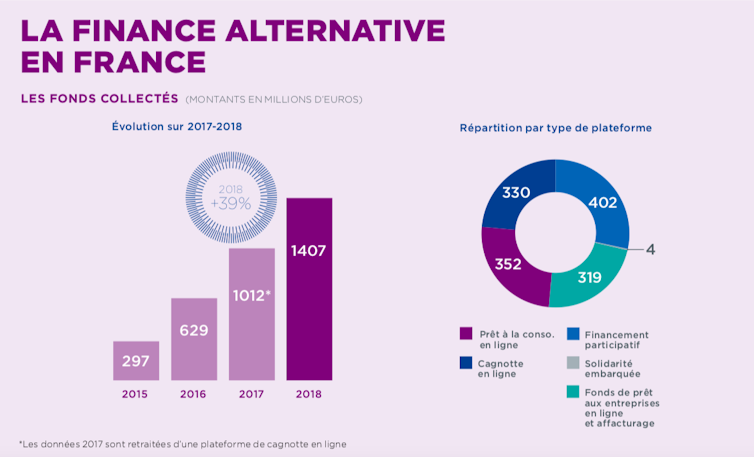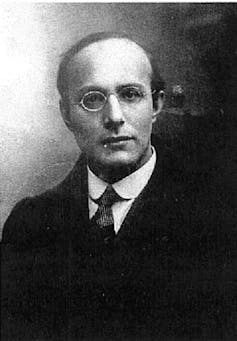Amélie Artis, Sciences Po Grenoble, Pacte-CNRS, and Virginie Monvoisin, GEM
Kitty for the reconstruction of Notre-Dame, kitty for the ex-boxer the ex-boxer on the Leopold-Sédar-Senghor footbridge, or to support the police force... Altruistic finance has been in the news the news since the beginning of the year. Initiated in the heart of social networks social networks, this movement uses digital forms to collect donations with the aim of financing a project of general interest. What they have in common is their spontaneity - everyone was surprised by the the creation of a fund for Christophe Dettinger as part of "act VIII" of the "gilets jaunes", whose payment to its to its beneficiary has yet to be decided by the courts - and their and their sometimes spectacular amounts: some people think that the Notre-Dame could exceed twice the total cost of the work!
But more than that, kitty groups offer a form of political action in the commercial world of the Internet. They raise questions about the values they may embody: should we support should we support this or that cause? They also call into question public authority: shouldn't the State be responsible for collecting funds for heritage? The choice of individual donation over deduction, which some see as a way of avoiding taxes, weaken the State? Finally, to what extent do these actions crystallize current changes in the relationship between market and and democracy?
Realities and ambiguities
Crowdfunding, kitty and on-board solidarity platforms (i.e. rounding up when making a payment) are becoming increasingly popular are becoming increasingly popular, moving beyond the circles of the insiders. According to the 2018 French crowdfunding barometer by barometer of crowdfunding in France, crowdfunding has jumped 39% in one year, and the first half of the first half of 2018 was already 36% up on the same period in first-half 2017. Among these participative financing practices, 113% (from 155 million euros in 2017 to 330 million in 2018).

While calls for solidarity and community financing are not new(the Statue of Liberty was financed by this principle inits day) in its day), it has taken on a whole new dimension with the development of Internet services, the democratization of its uses, and the current mobilization of social movements, in which social networks play a key role. social networks play an essential role.
Yet the ambiguities of altruistic online finance are regularly and there are many of them. Two of these seem to us to be the most the most surprising: on the one hand, altruistic online finance emancipates itself from the usual forms of reciprocity to come closer to the world; secondly, altruistic finance is reviving the debate on the the relationship between the market, altruism and democracy
Far from the usual reciprocity
While participatory finance is partly based on the mobilization (20.7% in France, according to KPMG figures), it seems to differ from traditional charitable actions. The are no longer the usual institutions of charity or philanthropy. charity or philanthropy. They are becoming financial intermediaries financial intermediaries who build their business model on the financial and social intermediation. The platform charges a commission in order to be rewarded for bringing together donors and recipients.
While the platforms' displays emphasize alternative and ethical aspects and ethical aspects, the use of values sows confusion. confusion. And this is exactly what happened in the case of the case of the former boxer's Leetchi We're a long way from highlighting the characteristics of the forms of altruism forms of altruism usually associated with philanthropy. philanthropy.
Let's turn to Karl Polanyi (1944), the author of reference for clarifying the relationship between economy and society. His work sheds light on the ambiguities associated of altruistic finance.
The Hungarian economist examines the difference between the the difference between the market economy and the gift. and the status of institutions. In the case of giving, individuals individuals are complementary, belonging to a political community that frames their actions. This community is supported by institutions institutions (political, religious, etc.) that are independent of the market economy. Giving is therefore the cement the interdependence of individuals and the basis for actions redistribution outside the market sphere.
Here, the ambiguity of platforms lies in their relationship with the commercial world. On the one hand, platforms do not necessarily create between donors and recipients. In fact share the same values: a donor may contribute to the launch of a new contribute to the launch of a start-up to "support" young people, while the young people, while the recipient only intends to finance his or her own project; a donor may contribute to a kitty to "support law enforcement", but forces of law and order", but the national police, as a public administration is already supposed to be paid for by taxpayers. The "discrepancies" between the protagonists' intentions are sometimes striking.
On the other hand, the platform sector is characterized by its diversity and often independence. Finally, they do not form an "institution" established in the economic landscape, insofar as they don't establish rules, conventions or beliefs conventions or beliefs that govern relations between agents. What's more, platforms do belong to the world of the market economy. market economy, as they are companies whose vocation is to generate sales. sales.
This new financing channel, based on donations, does not fall under the donation principle. the principle of giving; in short, alternative finance is based on the without adopting its principles of action.
The market, altruism and democracy
In the collective unconscious, the Internet is seen as a natural extension natural extension of the market and the free interplay of supply and demand. Many of the Internet's dominant players position themselves as "Walrasian auctioneers". "Walrasian auctioneers indispensable for bringing together supply and demand, ensuring transparency of information and the establishment of an equilibrium price.
This representation, based on the principles of equality, transparency and transparency and expression of all sensibilities echoes the democratic principles democratic principles embodied in our political systems. All it takes for us to believe that the Internet, like the marketplace are areas of economic democracy. And yet oxymoron, the market is far from being a space in which all agents are equal. agents are equal. Even beyond the existence of dominant positions dominant positions, the "game of supply and demand" is necessarily disrupted disrupted because some players have more power than others. The agents do not have the same economic functions, nor the same information. In a situation of uncertainty, they don't behave in the same way, or use the same sources of information. the same behaviors, nor the same sources of inspiration for these behaviors. sources we might call convention or institution.
In addition, the use of alternative forms of financing seems to be be an interesting way of regaining citizen and democratic power democratic power in the face of a financial system confiscated by an elite. From the outside the traditional financial system is structured around a strong hierarchy hierarchy (Central Bank, various regulations, etc.) and the heavyweights of finance (Société Générale, Natixis, Parisbas, etc.), some of which have been discredited since the 2008 financial crisis. Indeed, the banking sector banking sector is experiencing both a strong concentration around large banks and a growing lack of confidence in them. The alternative forms of financing appear to be an interesting response insofar as it avoids the need to call on players with economically powerful players, who seem to have the voice of savers the voice of savers, and in the final analysis, they enable us to be more with our own values.

Rvlsoft/Shutterstock
However, nothing is less certain. The Internet has undoubtedly become the place for all kinds of monopolies and oligopolies. Examples abound. The mechanism of network activity dominant position, and governments have yet to resolve this issue. have yet to resolve this issue; they remain powerless in the face of Google or Amazon or Amazon, companies that are no more than 20 years old. Let's bet that be the same for alternative finance. In fact, we can already see Kickstarter, Babyloan or... Facebook!
Thus, the market and the Internet do not allow for democratic expression of an economic nature. While some thought that the use of funding platforms would open up egalitarian and expressive prospects, the example of kitty groups shows us that, on the contrary, the market and finance are places of great symbolic violence and political struggle. Indeed, we must not forget that philanthropy is concomitant with the emergence of democracy, and that it is also a place ofexpression for political contestation. Today, as in ancient times, philanthropy is as much a means of financing activities of general interest as it is a modality of political action.
This analysis was originally published on The Conversation on June 18, 2019.
